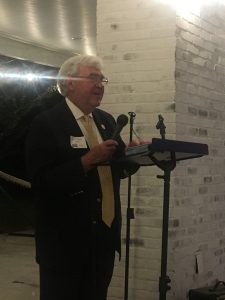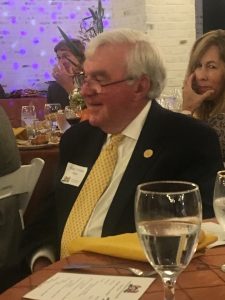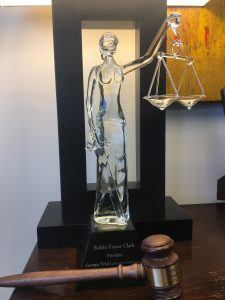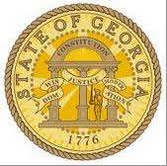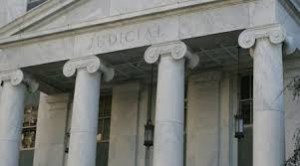|
I share with you my recent tribute to a wonderful man and judge, Judge Herbert Phipps, Chief Judge of the Georgia Court of Appeals. Judge Phipps will, at the end of this month, hand over the position of Chief Judge of the Court to Judge Sara Doyle, and so it is a proper moment to acknowledge his work and lifetime of public service and take stock in the sort of person we have had at the helm of the Court. Enjoy.
Greetings, Friends!
I have been extremely fortunate to have served in leadership positions in many bar organizations, and if there is one common theme to that experience, it is the intangible reward of getting the opportunity to get to know and work with some of Georgia’s greatest leaders in our beloved profession. People who, but for my work alongside them in some bar association, our paths might never have crossed. Once such person is Judge Herbert Phipps, a Past President of the Lawyers Club of Atlanta (and first African American President). When I think of Judge Phipps¸ I do not first think of his shining public service as the current Chief Judge of the Georgia Court of Appeals (the busiest appellate court in the United States, as Judge Ellington will remind us), but rather of his humanity and the example his life offers to us.
Over the years, I have enjoyed talking with Judge Phipps about his life and his place in the world. Many of these conversations happened over a drink at Lawyers Club. I would listen intently to stories told as only Judge Phipps can tell them, and then would ask him to tell one more, because they were so enthralling. It is not hyperbole to say that some of the stories Judge Phipps has told me seemed so outrageous I thought they had to have been made up. But they were all true. Running through all the stories is the common thread of Justice: Justice for the minority, justice for the disenfranchised, justice for the “little guy.” And Justice is one subject Judge Phipps knows much about. Judge Phipps was raised in Baker County, Georgia, a county so segregated that for years he didn’t realize that white children went to school, too. It was a place where racism was so open that lawyers would use a racial epithet to describe their own clients in court. While in college, Judge Phipps was active with the Student Nonviolent Coordinating Committee and the Southern Christian Leadership Conference during the civil rights movement. During this time he was working on voter registration in Albany, Georgia and was jailed for several days in a cell next to Dr. Martin Luther King. Judge Phipps’ only crime was being in a phone booth at night. He was never charged and was ultimately released. Dr. King shared the meals, brought to him by church ladies, with Judge Phipps. Injustice was all around him. But he could see that if one had the power of the law behind him, he might be able to turn around some of that injustice and start spreading the sweet richness of Justice, instead. So he decided to go to law school. As he so poignantly described in his address when he was named Chief Judge, “I decided that if I get ready, maybe my moment will come.” And so he got ready by becoming a lawyer. The only lawyer even willing to speak to him about a job after law school was (now famous) civil rights lawyer C. B. King in Albany, Georgia. Mr. King hired Judge Phipps and so began an historic career of service in the Georgia Bar.
If I have not yet convinced you about what kind of human being Judge Phipps is, ponder these words from Judge Phipps’s 2013 Law Day speech:
“For generations, lawyers have been at the forefront of the fight for equal justice. Yet, there is still a gap between the theory and the practice of equality. Lawyers must continue to be in the vanguard of the struggle to close that gap. While we are grateful for the gains that have been made, and for those who helped to make them, the question before us on Law Day 2013 is: What are you and I doing to finish the work that remains to be done? As lawyers and judges, we have the special training to do more public good than does a member of any other profession. This profession entrusts us with awesome power, from which flows great responsibilities. Often we will find that justice in the most fundamental sense is being denied persons in our presence, in our community, and in our state. Yet many who have the power and influence to do the right thing, and to encourage others to do likewise, will look the other way, or not even care. A good lawyer is sensitive to the injustices of society, and accepts a reasonable share of responsibility for correcting them. Obviously, one lawyer cannot right every wrong. But do not underestimate what one committed person can do to make the Dream a reality – Equality for All.”
That’s the kind of person who has led Lawyers Club of Atlanta and who may be the person you sit next to at the bar while enjoying a libation expertly prepared by Kenny Smith. Who else might you meet there? Maybe the lawyer who, after having been refused admission into the University of Georgia law school, later represented the person who integrated the college? Maybe the first Jewish lawyer to serve as President of the Lawyers Club? Maybe the first woman lawyer to win a state-wide race for a seat on the Georgia Court of Appeals? Maybe the lawyer who, as a young student at Emory University, marched against white racists and hatred in Forsyth County in the ’80’s? Maybe the lawyer who founded the Diversity Program of the State Bar of Georgia? Maybe the lawyer (now Judge) who defeated a sitting judge who would make litigants kneel in court and pray to Jesus Christ prior to trial, regardless of the litigants’ faith? Maybe the lawyer who shared a jail cell with Dr. Martin Luther King, Jr.? Whoever you find yourself with, as my good friend and LCA member Judge John Ellington would do, ask them “What’s your story?”
A Rising Tide Lifts All Boats,
Robin Frazer Clark
President, Lawyers Club of Atlanta
Robin Frazer Clark pursues justice for those who have personal injury claims as a result of being injured in motor vehicle wrecks, trucking wrecks, defective products, defective maintenance of roads, premises safety, medical malpractice and other incidents caused by the negligence of others. Ms. Clark is the 50th President of the State Bar of Georgia and a Past President of Georgia Trial Lawyers Association and has practiced law in Georgia for 26 years. Mrs. Clark is listed as one of the Top 50 Women Trial Lawyers in Georgia and is a Georgia Super Lawyer. Robin Frazer Clark~ Dedicated to the Constitution’s Promise of Justice for All. |
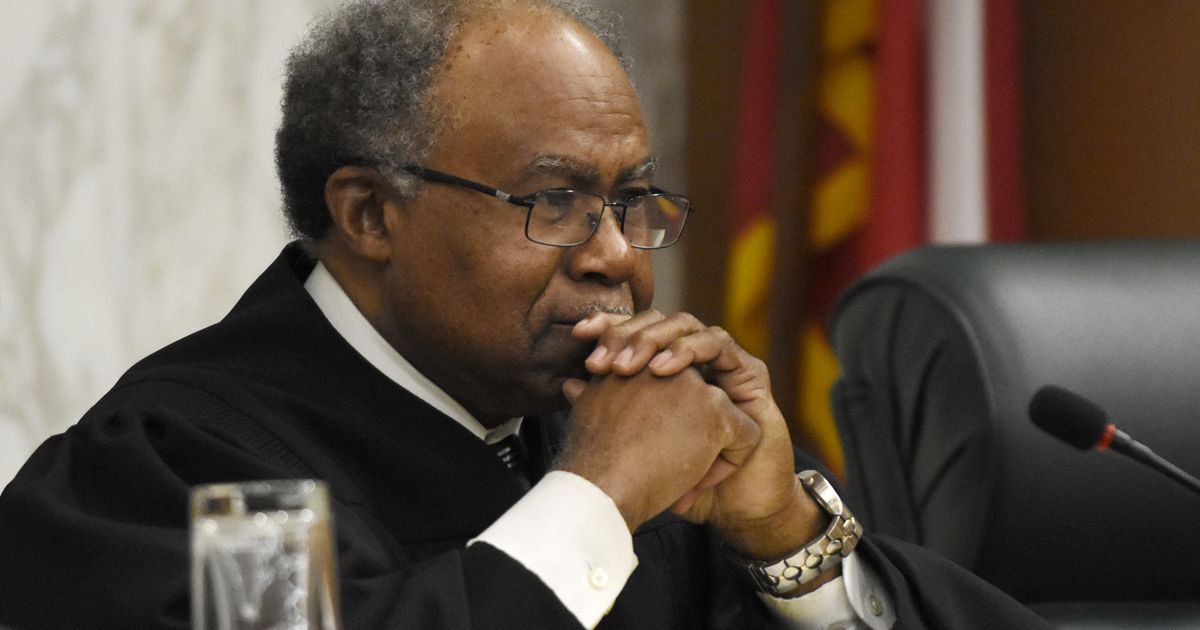
 Atlanta Injury Lawyer Blog
Atlanta Injury Lawyer Blog


